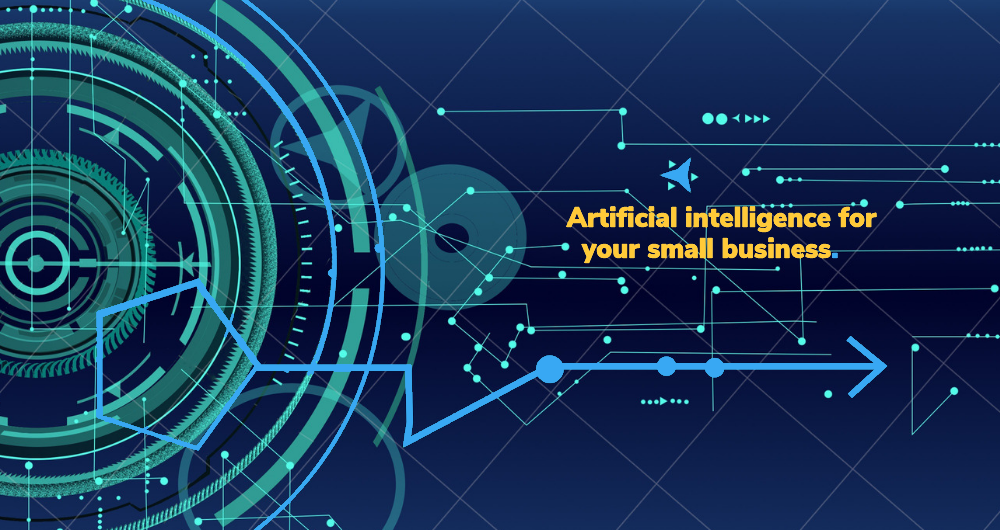How Small Business Owners Can Leverage AI for Growth

Table of Contents
Have you heard of JD.com?
Well, it’s a Beijing based company that collaborated with Siasun Robot & Automation Co Ltd. to use Artificial Intelligence in their warehouse operations.
The basic idea behind this was to:
- Reduce operational costs
- Increase the efficiency
- Lower the time consumed in product sorting
After implementing this initiative, the company received 1.26 billion online orders, double the number of orders they received in the previous year.
And according to emerj, most of these orders were delivered within 2 days.
Another more recent example is Netflix.
As per a case study, when the brand leveraged AI in the form of hyper-specific categorization for its search engine, it resulted in strong recommendations, more viewership and helped the brand save 1 billion dollars per year!
Even with such huge statistics and positive results, SMBs are still hesitant when it comes to new technologies and advancements such as AI and ML. And, the biggest reason behind this is the perception.
The perception that AI is not feasible for small businesses because SMEs lack adequate funds and resources to do so.
But this is not true.
Let us find out what makes AI and ML so expensive.
What Makes AI For Small Business so Expensive?
If the product is developed from scratch specifically for a company, the project sure is money-intensive and extremely expensive.
For example, the world-famous IBM Oncology Expert Advisor project was stopped after consuming $62 million!
But, if the already-developed AI modules and components are used in specific business sectors (that is being done all across the globe), SMEs can also reap the benefits of leveraging AI applications in business.
It is not necessary as well, to develop a custom AI module for every business. Also, it is not necessary to have AI applications in every business department and every business process.
One can employ AI in just one crucial business process to bring small business growth into effect.
Now, the following questions arise:
- How to identify the right business process for AI application?
- How to use AI for small businesses in general?
- How to make the best use of existing AI in every business model for SMEs?
Let us explore the answers to each one of these questions one by one.
How to identify the right business process for AI application
The best way to find suitable business processes for AI applications is to hold discussions with people from cross-disciplinary teams or departments.
This will help you identify these three types of business processes:
- Large Scale processes
- Automated processes
- Data-based processes
All of them are the most suitable candidates for AI applications in any business scenario.
Check out some examples of these processes for a more comprehensive understanding:
- Personalized marketing
- Image recognition
- Fraud detection
- Product recommendations
- Customer support
- Credit scoring
Now, let us move on to the next question: How to use AI for small businesses?
Small Business Growth Goals: 6 Ways to Leverage AI the Right Way
Screen Candidates Efficiently
In a small business organization, employees are the key factor in driving sales, work, and revenues. Hence, recruiting the right candidates is utterly crucial. AI-enabled recruitment software can not only bypass the manual sorting and screening of resumes but also lead to better screening by standardized matching. Ready to use AI for small businesses, also comes with candidate evaluation modules for making smarter recruitment decisions.
Even after recruitment, AI applications for small businesses can help to inspire, motivate, and engage the employees by various means such as credit and reward management modules or chatbots, etc.
Takeaway:
Small businesses can automate their workflows for recruitment, screen candidates efficiently, evaluate candidates and have better candidate sourcing by using AI applications in business.
Manage Company Accounts Easily
One of the biggest motivations behind AI was the need to automate the mundane, time-consuming, and tedious tasks. Accounts, inventory, sorting, and audits are some domains that are big on time investment and are extremely mundane.
Using the smart and AI-enabled expenses management systems, ledgers, book-keeping systems, reward management systems, and various other core accounting processes will make time for other entrepreneurial tasks such as devising new strategies and focusing on client acquisition.
Takeaway:
AI-enabled accounting systems can help achieve small business growth by automating the mundane accounting and helping entrepreneurs and management to invest time in other crucial and business-specific tasks.
Take Control of Your Projects
Companies using chatbots for project management and boosting collaboration and communication across the teams is nothing new. The SMEs can also make use of these free or highly affordable paid AI applications for small businesses and achieve better control over the project lifecycle.
AI has the inherent capability to identify patterns and can directly assist managers with administrative tasks. Record-keeping, remedial tasks, and various other reporting tasks can be easily automated by using AI for small businesses. Predictive analytics such as identifying frauds, predicting schedule lags, or missing deadlines is yet another benefit of using AI in project management. When everybody works with a meticulous plan, and no time is wasted on mundane activities, the growth is inevitable.
Takeaway:
AI automates a majority of administrative work and makes time for the project managers to focus on core business tasks. It also helps in creating better project plans and timelines based on the knowledge base and previous records.
Deliver Exceptional Customer Support
AI can help you take your customer support to the next level!
The dynamics of great customer support are:
- Ensuring that your customers feel the pride of being listened intently
- Delivering personalized experiences based on previous situations
AI is inherently able to cull insights from data and can help small businesses in devising an exemplary support system. For example, Deutsche Bank uses AI to process the real-time data and find out whether an applicant can be given a loan or not when the application is being filled, and not after it has been submitted.
AI offers:
- Predictive customer modeling to discover the customer needs
- Communications triggered by activities in a pre-scheduled manner over various channels for better support and better ticketing
- Improved metrics related to customers such as increased conversions, reduced customer churns and stronger recommendations, etc.
AI can also help highly competitive businesses have insights into their competitors’ strategies for devising better business plans and marketing strategies.
Takeaway:
SMEs can rely on AI to deliver impeccable customer support and personalized customer experiences via help desk software for small business, that can lead to better revenues and steady business growth.
Analyze Overall Company’s Performance
AI for small businesses can help entrepreneurs to analyze the performance of the company as a whole.
You can find the processes that can be automated entirely:
- Automated training of salespersons for closing more deals
- Devising better marketing strategies
- Finding actionable insights from company data and knowledge repositories to discover hidden patterns related to growth
- Cost of operations and lots more.
The CEOs can also use AI to have virtual assistants at much lower costs with better efficiency.
These virtual assistants can schedule meetings, identify the lagging employees, come up with ways to motivate and engage employees, perform calendering, and do much more!
Takeaway:
AI helps the entrepreneurs to gather actionable data for boosting the performance of their company as a whole. It can help them in identifying all the process-people gaps and offers valuable analytics to work upon.
eCommerce customer experience
Amazon has been using AI for personalized eCommerce customer experiences in the form of shopping recommendations, dynamic pricing and has even opened free physical stores where customers can check-out the merchandise with the help of AI-driven cameras and sensors.
The SMEs working in eCommerce can take cues from the brand to offer personalized customer experiences and boost their credibility and fandom.
Takeaway:
AI empowers the eCommerce enterprises to make shopping more personalized and well-suited for all their customers. It also helps them in avoiding customer churn and gaining recommendations.
These are some ways to leverage AI for growth in small business.
How to make the best use of existing AI in every business model for SMEs?
Mentioned below are some of the ways to make the best of AI for small business in every business model:
- Automate the mundane, time-consuming and semi-automated tasks
- Use AI for customer metrics, project analytics, and customer experience
- Employ AI applications in business to boost communication within team and departments
- Employ AI-enabled tracking and monitoring systems
- Use AI for employee and agent training
We hope this discussion helps you change your perception of AI application in Small Businesses and motivates you to choose smart and future-ready AI applications.
So, boost your ROI and customer experience with the latest AI applications and reap the benefits of being a smart business!





